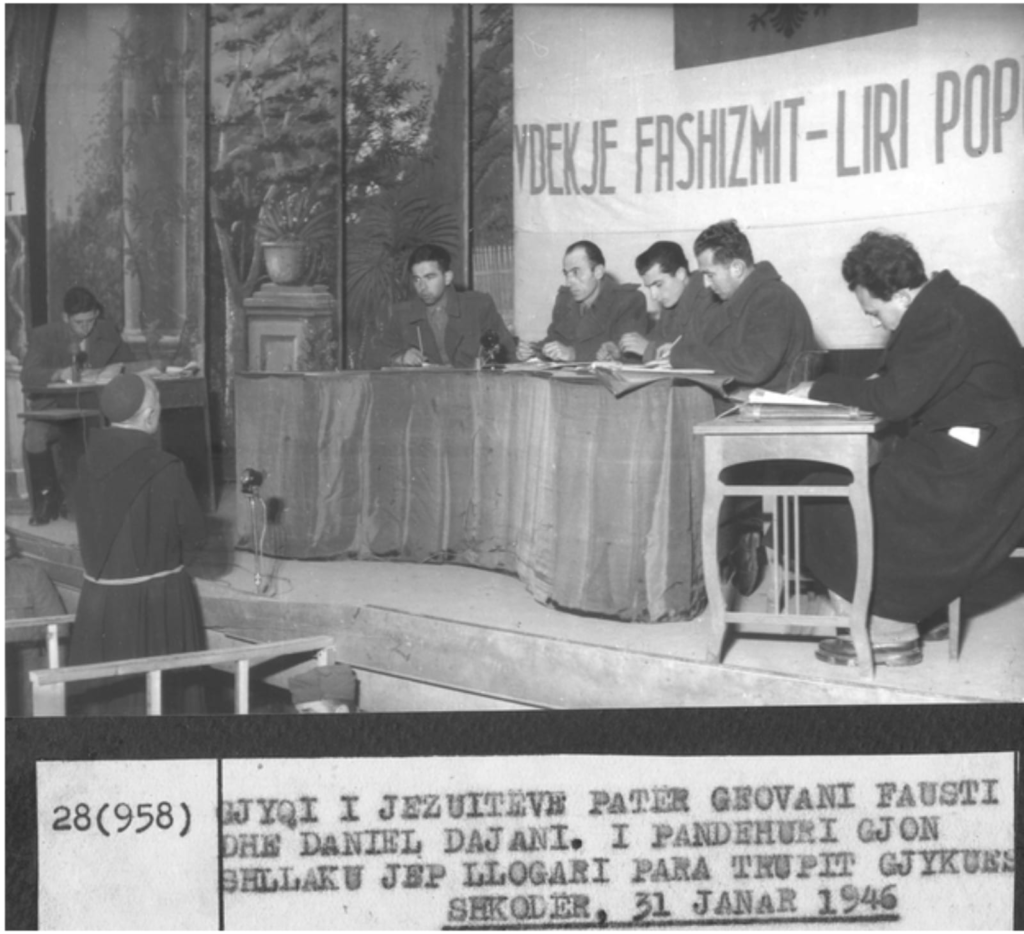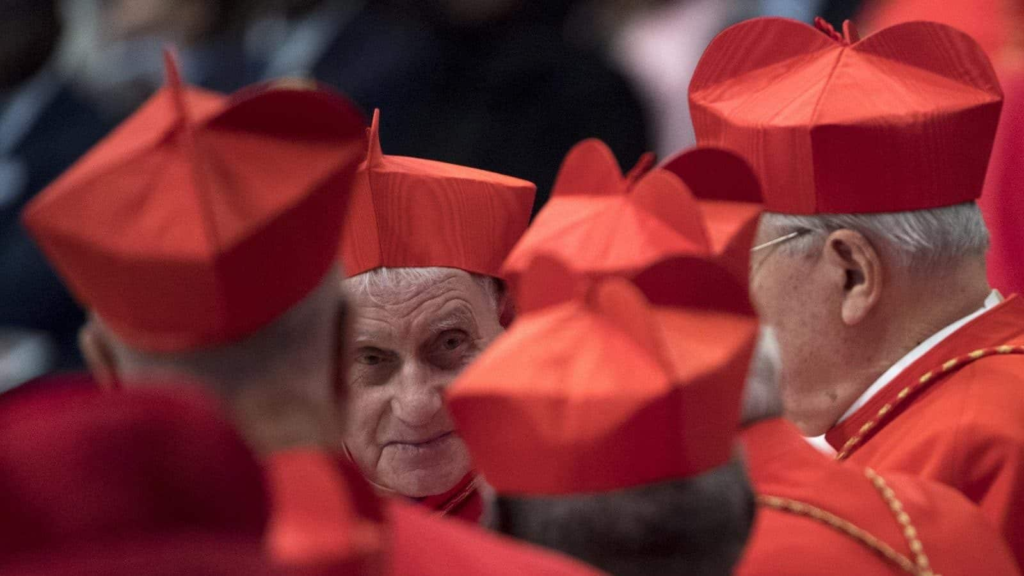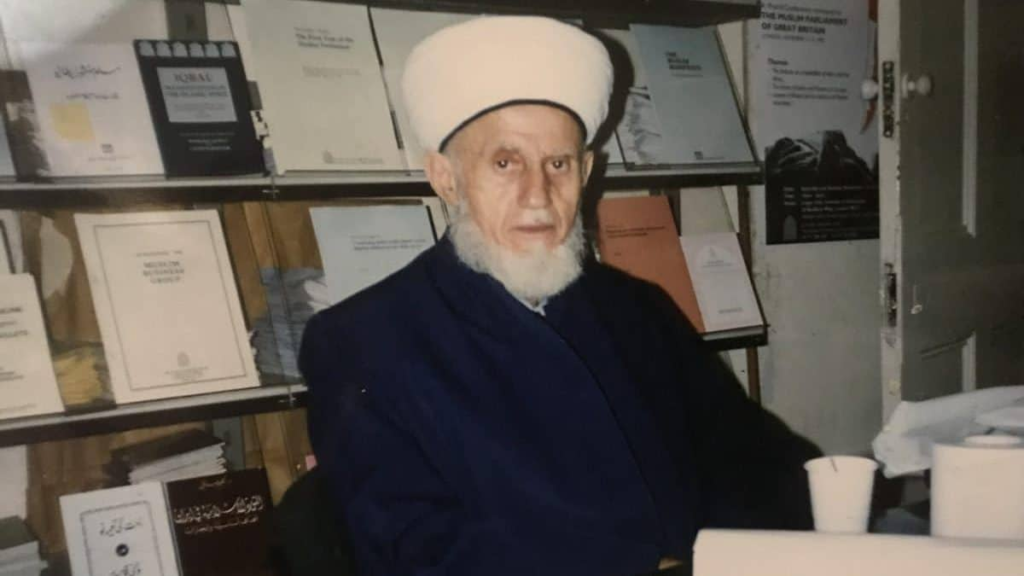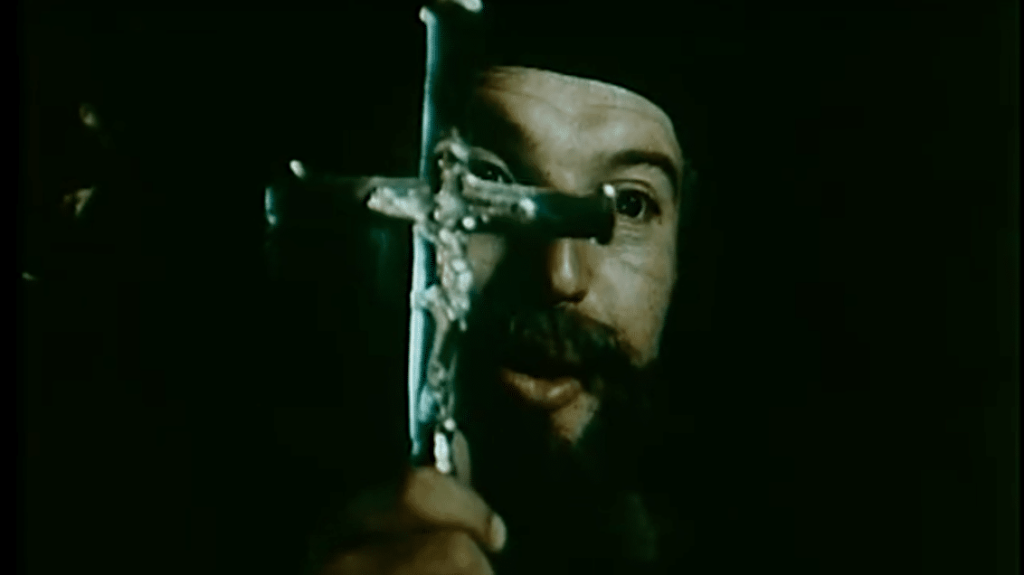Albania’s communist regime outlawed religion and waged a decades-long campaign of repression against Christian and Muslim believers, jailing and executing clerics and persecuting their families – but some continued to practice their faith in secret.
“Once the war ended, the communists came along with their destruction… Our professors [of religion] were shot… imprisoned… they treated us like animals.”

Father Ernest Simoni Troshani, an Albanian Catholic priest, is recalling the post-World War II period in his country, when the regime led by communist dictator Enver Hoxha launched a crackdown on clerics and religious believers.
After Troshani held a mass in memory of US President John Kennedy when he was assassinated in November 1963, he was arrested on Christmas Eve and went on to spend 28 years in prison.
He was not the only religious figure to be subjected to severe repression under communist rule. An anti-communist speech led Muslim cleric Hafiz Sabri Koci to be jailed for more than 20 years; Catholic priest Shtjefen Kurti was shot for baptising children after he had already spent 20 years in jail, while another Muslim cleric, Hafiz Ali Kraja, only met his son for the first time at the age of five through the bars of a cell in the prison where he was held two decades.
These men’s suffering was a result of the war waged on clerics of all religions by the Hoxha-led Party of Labour under the slogan “Religion is the opium of the people” – a quote adapted from the writing of communist philosopher Karl Marx.
In 1976, the Party of Labour even declared Albania to be the first atheist country in the world, putting a ban on religious belief in the constitution and imposing punishments for participating in religious ceremonies and possessing religious books. Meanwhile, faith in Hoxha, communism and the party was encouraged.
Through a well-organised system of propaganda including media and movies, the dictatorial state denigrated clerics, targeting them as backward, negative influences on society, agents connected to the West, or even dangerous members of armed groups seeking to seize power by force.
But despite the state’s commitment to the destruction of religious institutions, the burning of sacred books, the imprisonment and execution of priests and imams, some Albanian families continuing to practice their faith in secret even though, as so-called ‘enemies of the people’, this put their lives at risk.
Hoxha announces the abolition of religion

The war against the clergy began after the communists came to power in Albania in 1945. They saw Catholic clerics, who had strong international ties and rejected communist propaganda, as a threat.
In December 1945, dozens of Catholic clerics and believers were arrested, 39 of whom were convicted at military-led trials, with harsh penalties imposed. In March 1946, seven believers were executed.
The campaign against religion intensified after Hoxha gave a speech on February 6, 1967 which officially launched the battle against “religious ideology”. Hoxha’s speech was followed by a letter from the central committee of the Party of Labour intended to guide the assault on religion across the country.
“Religion is the opium of the people. We must do our best to make everybody understand this, even those who have been poisoned (who are not few in numbers). We must cure them. This is neither an easy job, nor impossible,” the letter said.
Political rhetoric and intense media propaganda spurred young people to target religious sites. According to the Memory Museum, an online project by the Albanian Institute of Political Studies, 2,169 religious institutions were closed, including 740 mosques, 608 Orthodox churches, 157 Catholic churches, and 530 turbe (Ottoman mausoleums) and teke (Sufi religious sites). Cultural and historical heritage was destroyed along with them.
Nikolin Kurti, nephew of the persecuted cleric and dissident Shtjefen Kurti, recalled how this created “an atmosphere of insecurity”. He remembered a particularly disturbing incident in the winter of 1968 that he witnessed while he was going to school in Tirana one morning.
“In Kavaja Street, there was a long queue of trucks filled with people. The trucks were going to take the people to internment camps. They stayed there for two hours to intimidate people who were going to work or school. They were trying to show everyone the danger that awaited them if they ‘deviated from the party line’,” he said.
Religious beliefs were completely banned in the constitution of the People’s Republic of Albania in 1976, nine years after Hoxha’s speech.
Article 37 of the constitution declared: “The state recognises no religion and supports and develops atheistic propaganda to engage people in the materialistic scientific worldview.”
Article 55 meanwhile prohibited the establishment of any organisation of a religious character.
Arrested ‘in the name of the people’

One of the most absurd cases of persecution was suffered by Father Ernest Simoni Troshani, now aged 90 and one of the most respected Catholic figures in Albania.
“It was Christmas Eve on December 24, 1963, when I had finished saying mass and four people came up to me. Two of them had military uniforms and the two others were dressed like civilians,” Troshani recalled.
“They tied my hands behind my back in a brutal way as if I were a dangerous criminal and told me that ‘you are being arrested in the name of the people’, and added: ‘You will be hanged because you told people and youngsters that if necessary we must give our life to Jesus Christ.’ They treated me savagely, in front of my old parents, whose eyes were filled with tears,” he added.
Since the practice of religion was not yet forbidden by law at that point, clerics were accused of other violations in various fabricated cases.
“The accusations were all stupid, but in the end they were formulated as agitation, propaganda and attempted escape, and they added something else about a mass I held when John Kennedy was killed, [which was true] because when the US president was killed, the Pope of Rome advised all the priests in the world to hold a mass for his spirit,” explained Troshani.
The cleric said that he was tortured in the prosecutor’s office in an attempt to force him to admit to the false charges against him.
“They tried every method, tightened the handcuffs so that my blood flow was restricted… I do not know how I am alive today, but when the Lord sends a trial, he also gives the power to deal with it,” he said.
Troshani was sentenced to 25 years in jail, 18 of which he spent incarcerated at the Spac political prison in the north of the country, where inmates were forced to do hard labour in the prison’s adjacent copper and pyrite mines.
In May 1973, a group of prisoners staged an uprising against their guards and started to call for freedom and the end of Communism.
“The camp was surrounded by armed soldiers, and they started to shoot into the air. Then I was arrested together with other 12 to 13 other people [accused of being organisers of the rebellion],” Troshani recalled.
“I did not have the slightest idea what was going on, but the situation deteriorated when they put as all behind a wall and began to call out names. Three people were shot in front of me,” he continued.
Troshani’s life was spared, but he remained in prison. Although the rules were strict, he continued to practise his faith in secret, holding mass and taking confessions. Meanwhile, as state persecution was also extended to clerics’ families, Troshani’s relatives were put under surveillance by the feared secret police, the Sigurimi.
But after he was finally released from prison, Troshani was arrested yet again and sentenced to do hard labour working in sewage canals.
Ramadan behind prison bars

Albanian Muslim clerics were also subjected to repression by the Communist regime.
Mehdi Kraja, son of one of the most famous Muslim figures in Albania, Hafiz Ali Kraja, recalled how his father spent many years in prison after making a speech entitled “What is Communism and its consequences for Albanian religion and the nation”.
The speech resulted in Hafiz Ali Kraja being immediately classified as an anti – Communist, and forced him to go into hiding with a family in the town of Shkoder for about two years from 1944-45.
He concealed himself in a cellar, from which he only emerged after an amnesty was declared which promised: “All those who are being sought by the authorities will be forgiven the death sentence and will only be imprisoned.”
Hafiz Ali Kraja was then sentenced to 25 years in prison. But while he was in hiding, his brothers had been tortured by the authorities in an attempt to get them to reveal his whereabouts.
“We did not tell our father what was happening, but he was surprised when his brothers went to prison,” said his son, Mehdi Kraja.
The cleric’s children grew up without seeing him. “When he left prison, my sister was afraid because she could not recognise that he was her father. I myself saw father at home [for the first time] at the age of 26,” Mehdi Kraja recalled.
He also recalled how he was mistreated at school because his father was in prison for his religious activities. In one incident, a teacher made him stand up in class and tried to humiliate him, calling him a “son of a reactionary” and “son of an enemy of the people”.
As relatives of the convicted imam, Kraja’s family was sent into internal exile from 1955 to 1958 in Bajram Curri in the remote north of Albania.
Despite the repression, Kraja said that his father observed Ramadan in jail and the family continue to follow Muslim cultural traditions.
Hafiz Ali Kraja eventually left prison in 1965, after serving 19 years.
‘I had never seen father at home’

One of the most tragic and absurd stories of Communist persecution in Albania is that of Father Shtjefen Kurti.
Kurti was born in 1898 in Kosovo, which at the time was part of the Ottoman Empire. He studied in Austria and Rome, and after being ordained as a priest, came to Albania, where he was where given citizenship and support for his Catholic mission by King Zog. His nephew Nikolin Kurti said he was the confessing priest for Mother Teresa and Queen Geraldine at the royal court until 1939.
But after World War II ended, with Hoxha’s Party of Labour now in power, Shtjefen Kurti was arrested in 1946 and sentenced to 20 years in prison as a Western agent, of which he served 17 years.
He was released at the age of 68, his nephew Nicolin Kurti recalled.
“When he got out of prison in 1964, he came home one night and that was when I got to know him for the first time in person. He was all wrinkled, crooked, ill,” Kurti said.
Three years after his release, Hoxha stepped up his war on religion and after the demolition of the churches and mosques, Kurti, now old and sick, was assigned to do agricultural work in a village. During this period, he was tracked by 16 state security agents, according to his file.
However, he was also baptising children in secret. “This was obviously noticed by the state security, and in 1970 he was arrested at the age of 72,” said Nikolin Kurti. He was accused of espionage, sabotage and secretly conducting religious ceremonies.
After the fall of the Communist regime, Nikolin Kurti researched the details of his uncle’s persecution and from his security file he found that Shtjefen Kurti was subjected to a five-day show trial in a building that ironically had previously been a church, and then sentenced to death.
Court reports reveal how, after the judge asked the priest if he had anything to say, Shtjefen Kurti responded: “You are not condemning me to death, because death and life is in God’s hands, but you are condemning me to a shortened life.”
He was executed in September 1971 at a location which remains unknown to this day, but his family was not informed. “The family learned about this in early March 1973, when an Italian radio station reported in its news that ‘in Albania, Shtjefen Kurti was shot for baptising children’,” said Nikolin Kurti.
In other cases, imprisonment left children without parents for long periods of their early lives. Qaramet Koci, the son of imprisoned Muslim cleric Hafiz Sabri Koci, said he did not see his father for 20 years, from the age of seven until he was 27.
“When my dad came home, it was a great joy, but I was not used to this. I had never seen father at home,” Qaramet Koci said.
Movies spread anti-religious propaganda

During the Hoxha era, a cinematic team at Kinostudio Shqiperia e Re (New Albania) dedicated itself to producing films that delivered anti-religious propaganda.
In films with titles like ‘Liri a vdekje’ (‘Freedom or Death’) and ‘Te vdesesh ne kemb’ (‘To Die on One’s Feet’), clerics were accused of organising forced marriages, being corrupt, trying to overthrow the authorities, receiving assistance from foreign powers, and being traitors.
Such propaganda films were broadcast hundreds of times on the only Albanian television station that existed before communism fell – and are still being shown now by private TV channels in the country.
“These propaganda movies only caused damage. Year after year, they created imaginary enemies, unfairly accused groups of people, and created false realities,” said Jonila Godole, the head of the Institute for Democracy, Media and Culture.
Hundreds of articles were also published by Albanian newspapers in attempts to persuade readers to turn against religion, often accompanied by photographs from the trials of clerics with captions labelling them as traitors or enemies of the people, or by mocking caricatures.
Thirty-three years of compulsory atheism left a mark on Albanian society, said sociologist Zyhdi Dervishi.
“I think that Albanian society entered the market economy and democratic processes with two major disasters, the first one being a rotten state without consolidated state structures and the second being that it was without religious education,” Dervishi argued.
He suggested that the lack of religious values “damaged the socialisation of Albanians” and resulted in wider involvement in crime.
Despite Enver Hoxha’s ban on worship, which endured until the fall of communism in 1990, the majority of Albanians today say they are religious believers.
According to the 2011 census, 56.7 per cent of the country’s citizens consider themselves to be Muslim, 10.03 per cent are Catholic, 6.75 per cent are Orthodox and 2.09 per cent are Bektashi.
A total of 13.79 per cent declined to say whether or not they followed any particular faith, but only 2.5 per cent declared that they were atheists.
However, although Albanians are now free to follow whichever religion they choose, the relatives of those who suffered for their beliefs under Hoxha’s rule will never be able to forget the tragic stories from the years of repression.


